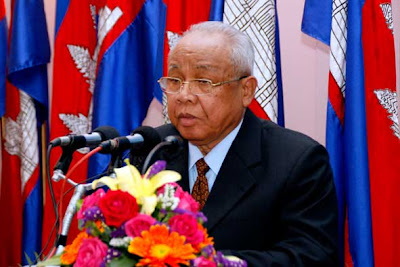 (Top to bottom) Beaming CPP Chairman Chea Sim (middle) chatting cordially with CPP Vice Chairman and Prime Minister Hun Sen on his left and CPP Honorary Chairman on his right at the ceremony; CPP members at the 7 January Victory Day celebration; Chea Sim reading speech at the event (TVK, 7 Jan)
(Top to bottom) Beaming CPP Chairman Chea Sim (middle) chatting cordially with CPP Vice Chairman and Prime Minister Hun Sen on his left and CPP Honorary Chairman on his right at the ceremony; CPP members at the 7 January Victory Day celebration; Chea Sim reading speech at the event (TVK, 7 Jan) On 7 January, Cambodian Government-run Phnom Penh Television Kampuchea [TVK] in Cambodian at 0537 GMT carried a 35-minute recorded video report, following its midday newscast, on the Cambodian People's Party [CPP] marking the 29th anniversary of the victory of 7 January under the presidency of CPP Chairman Chea Sim, CPP Honorary Chairman Heng Samrin, and CPP Vice Chairman Hun Sen at the party headquarters in Phnom Penh on the morning of 7 January.
Also present at the ceremony were members of the Senate, National Assembly, and Royal Government of Cambodia, representatives of allied parties, foreign diplomats, and large crowds of people.
At the event, CPP and Senate Chairman Chea Sim read a prepared speech expressing "loyal salutations and profoundest gratitude" to King Norodom Sihamoni, former King Norodom Sihanouk, and former Queen Norodom Monineath Sihanouk, who "have sacrificed all-out physical and moral efforts for the sake of independence, peace, national unity, sovereignty, territorial integrity, prosperity, and happiness of the Cambodian motherland and people." He also wished them abundant health, physical strength, clear-sightedness, and longevity so they could "remain as the cool shade for the Cambodian people forever."
Continuing his speech, Chea Sim recalled efforts exerted by the Cambodian people and the Kampuchea United Front for National Construction and Defense, supported and assisted by the volunteer Vietnamese troops and peace-and justice-loving forces worldwide, to "attack and overthrow" the atrocious and barbaric Khmer Rouge [KR] regime on 7 January 1979.
Chea Sim further said that in Cambodia, "democracy, freedom, the respect for human rights, and the state of the law have been restored, protected, strengthened, and expanded constantly on the basis of ensuring the interests of the nation and people."
Chea Sim also recalled that the CPP had "played the role as core force in successfully solving post-election political deadlocks, the issue pertaining to the throne stability, and border problems with neighboring countries; in consolidating national unity; and in amending the Constitution, changing the two-thirds majority system to the system of absolute majority." The CPP had also, he added, "restored and elevated the nation's reputation by taking part in international affairs" with countries in the region and the world.
In his speech, Chea Sim criticized some "insane circles for taking themselves for the enemies of the 7 January victory and of the people's revival, seeking all possible means to overthrow the people's power with the aim of bringing back the genocide regime."
Chea Sim extolled the Cambodian Government for its all-around achievements with the implementation of the win-win policy, adding that in 2008, the government, under the leader the leadership of Prime Minister Hun Sen, would "continue to implement its priority policies, especially in those in the economic, financial, and social sectors."
On the question regarding democracy and human rights, Chea Sim said the CPP would continue to "protect and uphold democracy and the respect for human rights." He added that concretely, "democracy and human rights in Cambodia have not developed thanks to remarks or reports by some circles that refuse to understand and accept the truth."
Regarding elections, Chea Sim called on all to take part in improving the poll process, allowing the Cambodian people to "express their wish fully and freely."
On the question about the prime minister candidate, Chea Sim said, "On this occasion, I wish to reaffirm solemnly that the CPP has unanimously decided to appoint CPP Vice Chairman Samdech Akkeak Senapakdei Decho Hun Sen as the candidate for the position of Prime Minister of the Royal Government of Cambodia in the next fourth legislature of the National Assembly." [applause]
With regard to cooperation with the FUNCINPEC [National United Front for an Independent, Neutral, Peaceful, and Cooperative Cambodia] Party, Chea Sim said the CPP would "continue to strengthen the close cooperation with the FUNCINPEC Party and all the patriotic circles in society. This is in order to promote the implementation of the Royal Government's policies to score new achievements for the nation and to protect political atmosphere to allow the election to proceed well. This cooperation will be strengthened and expanded both before and after the election."
Commenting on the process of the Khmer Rouge Tribunal, Chea Sim said, "The CPP supports the ongoing process, supported nationally and internationally, of the Extraordinary Chambers in the Courts of Cambodia [ECCC] to try the crimes committed under the Democratic Kampuchea [DK] regime. We believe the national community, which is fully aware of the sufferings and injustice experienced by the Cambodian people under the DK regime, will certainly continue to provide the ECCC with moral and material assistance. Along with this, we reject any acts that will take advantage to use these courts in an attempt to cause division in Cambodian national society."
To conclude, Chea Sim said, "The people's political decision in the forthcoming election is of most determining significance for the country's destiny. In other words, only a political party that can ensure genuine peace, stability, democracy, and development should be elected."










































